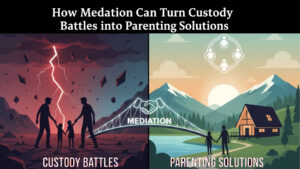Divorce mediation can save time, money, and emotional stress, but only if handled the right way.
Many couples begin the process believing that cooperation alone will carry them through. The intention to keep things civil is there, but mediation depends on more than goodwill. It requires preparation, patience, and clear communication from both sides. When any of these pieces fall short, even simple discussions start to feel heavy.
This usually happens quietly. One person arrives uncertain about their financial details. The other struggles to separate emotion from decision-making. Soon, the conversation slows, and what started with good intentions turns into frustration. These moments are normal, but they are also preventable with the right guidance.
At San Diego Family Mediation Center, we help couples stay organized and focused so progress never slips away. Our mediators create an environment where both voices are heard, and every concern is addressed with clarity. Through structure and support, we keep discussions steady, practical, and fair.
Each session is an opportunity to move forward, not to revisit old conflicts. When handled correctly, mediation gives both people control over their outcomes and a sense of stability for what comes next.
If you are beginning the mediation process and want guidance that keeps discussions calm and productive, schedule a free consultation with San Diego Family Mediation Center to learn how mediation can help you reach fair and lasting agreements.
Let’s look at the common mistakes that can disrupt this process and how to avoid them so your mediation stays productive and peaceful from start to finish.
Why Mistakes Happen in Mediation
Mistakes in mediation rarely happen by choice. They happen because divorce brings pressure, uncertainty, and emotion into every conversation. When both people are trying to make major decisions while managing grief, frustration, or fear, even simple discussions can turn complicated.
Emotional tension is often the first barrier. It clouds judgment and shifts attention away from solutions. A single unresolved feeling can make it difficult to listen or compromise. This does not mean the process is failing. It means both people are human and still adjusting to change. Feeling emotional during mediation is normal, but letting those feelings lead the discussion can pull both people away from practical solutions.
Lack of preparation is another common reason progress slows. Many couples walk into mediation without a clear understanding of their finances, parenting priorities, or long-term goals. Without this clarity, discussions lose direction. Preparation turns uncertainty into structure. When each person knows their needs and has their information ready, decisions come faster and feel more fair.
Unrealistic expectations also cause frustration. Some people hope mediation will solve every issue in one meeting, while others expect the mediator to decide for them. Mediation works best when both participants understand that it is a process, not a shortcut. It takes time, patience, and openness to reach agreements that last.
These challenges are normal and fixable. With professional guidance and the right mindset, couples learn to manage emotions, prepare effectively, and approach each session with realistic goals. At San Diego Family Mediation Center, we help clients stay grounded through every step so the process feels steady, respectful, and productive.
Mistake #1: Arriving Unprepared

Arriving unprepared often slows mediation and creates unnecessary stress. Preparation allows both people to communicate clearly and make thoughtful decisions. Without it, sessions lose direction, and simple topics become harder to resolve.
The most important part of preparation is having complete financial information. Documents such as income statements, tax returns, and records of assets and debts give structure to the discussion. When both people understand the facts, it becomes easier to reach fair and balanced agreements.
Clarity about goals is equally important. Knowing what outcomes you hope to achieve helps the conversation stay focused and productive.
Preparation should also include planning for parenting discussions. Writing down schedules, routines, and priorities for your children helps keep the focus on their needs and reduces emotional tension during the session.
When both people arrive prepared, mediation feels organized, efficient, and respectful. Each session moves forward with purpose because every decision is supported by clear information and mutual understanding.
To prepare effectively and begin your sessions with confidence, visit How to Prepare for Your First Mediation Session.
Mistake #2: Treating Mediation Like a Court Battle
Treating mediation like a court battle often turns cooperation into conflict. Try to keep in mind that you came into mediation to avoid court – so try not to compare it to court. Mediation and a mediated agreement will be better than a court outcome, 100% of the time. Mediation is not about proving who is right but about finding balanced solutions that work for both people. When one person focuses on winning, communication breaks down, and decisions become harder to reach.
The purpose of mediation is to resolve issues through understanding, not argument. Progress happens when both individuals share their concerns honestly and stay open to compromise. Focusing on solutions instead of blame helps create agreements that feel fair and lasting.
The mediator’s role is to remain neutral and guide discussions so both sides are heard and respected. With that structure in place, mediation becomes a constructive process that leads to resolution rather than competition.
Mistake #3: Letting Emotions Take Over
Letting emotions take over during mediation often makes resolution more difficult. Feelings of anger or resentment can take attention away from problem-solving and lead to defensive reactions that slow progress. When conversations become emotional, it becomes harder to listen, understand, or make balanced decisions.
Recognizing emotional triggers helps prevent them from disrupting the process. Taking a brief pause when tension rises allows both people to regain focus and continue discussions calmly. Keeping attention on long-term goals, such as financial stability or the well-being of children, helps maintain perspective and prevents short-term emotions from guiding important choices.
Managing emotions does not mean ignoring them. It means addressing them in ways that support clear thinking and respectful communication. With patience and focus, mediation becomes a constructive process built on understanding rather than conflict. For techniques on staying emotionally balanced during discussions, visit this Psychology Today article on emotional regulation.
Mistake #4: Hiding Information or Being Dishonest
Hiding information or being dishonest during mediation breaks the foundation of trust that the process depends on. When one person withholds financial details or misrepresents intentions, it creates doubt and prevents real progress. Mediation works only when both people share accurate and complete information so that decisions can be made fairly.

Transparency allows both sides to understand the full picture and make choices that last. Concealing assets, income, or debts may seem like a way to protect personal interests, but it often leads to resentment and future disputes. When everything is open and clear, discussions remain focused on solutions rather than suspicion. Full disclosure also helps the mediator guide both parties toward agreements that reflect fairness and stability.
Honesty strengthens the process and the outcomes it produces. When both individuals act with integrity, trust grows, and communication becomes easier. This openness creates a foundation for peaceful resolution and helps both people move forward with confidence and respect.
When both people commit to open communication, mediation becomes far more effective. To understand how this approach supports your family’s future, explore Family Mediation San Diego for insight into creating balanced and respectful resolutions.
Mistake #5: Ignoring the Children’s Needs
Ignoring the children’s needs is one of the most damaging mistakes that can happen during mediation. Parents often become so focused on resolving their own disagreements that they lose sight of how each decision affects their children. When attention shifts away from the children’s well-being, the process becomes less about building stability and more about settling personal disputes.
Keeping the children’s best interests at the center of every conversation helps guide choices that support their emotional and practical needs. This means thinking about school routines, communication between parents, and the child’s sense of security in both homes. When both parents approach mediation with this shared focus, discussions become more cooperative, and outcomes tend to be more lasting and peaceful.
Children benefit most when their parents work together with respect and care. By focusing on stability rather than conflict, parents can easily protect their children from unnecessary stress and create a healthy foundation for the future.
Mistake #6: Rushing the Process
Rushing through mediation often weakens the quality of decisions made. When the focus shifts from understanding to finishing, essential details are missed, and the outcomes may not hold up once the agreement is in place. Mediation is most effective when both people take the time to explore each issue carefully and consider its long-term impact.
Allowing enough time for discussion helps both individuals think through the practical and emotional sides of their decisions. It creates room to evaluate financial arrangements, parenting responsibilities, and personal priorities with clarity. When each step is given thoughtful attention, the process becomes less stressful and more balanced for everyone involved.
A patient and steady approach leads to fair and lasting results. Taking time to reflect before finalizing agreements ensures that every decision supports stability, respect, and peace of mind for both people moving forward.
Mistake #7: Not Choosing the Right Mediator
Choosing a certified and experienced mediator is essential for achieving fair and lasting results. A skilled mediator understands how to balance emotional concerns with practical decision-making so that both people can communicate clearly and stay focused on solutions.
Their experience helps prevent misunderstandings and keeps discussions steady and productive from start to finish.
At San Diego Family Mediation Center, our mediators combine professional expertise with a calm and supportive approach. They guide each session with structure, fairness, and respect, ensuring that both individuals feel heard and understood. This balanced guidance helps create agreements that are realistic, sustainable, and beneficial for everyone involved.
To learn how our mediators can support your situation and help you move toward resolution, visit our Consultation and Contact Page.
Frequently Asked Questions
What happens if mediation fails?
If mediation does not lead to an agreement, both parties can choose to continue negotiations later or move the case to court. Even if mediation ends without full resolution, the discussions often clarify key issues, making any next steps more efficient.
Can I stop mediation anytime?
Yes. Mediation is a voluntary process, and either person can stop at any point.
How do I know if my mediator is neutral?
A qualified mediator treats both parties equally and never takes sides. They focus on guiding the conversation and helping both individuals reach balanced decisions. You can surely ask your mediator about their experience, training, and ethical standards before beginning.
What if my spouse refuses to communicate?
Skilled mediators know how to manage emotional tension and keep discussions calm and productive so both people can focus on practical solutions.
Conclusion
Avoiding common mistakes in mediation creates a smoother, more productive, and less stressful process for both people. Preparation, honesty, patience, and focus all work together to make each session meaningful and effective. With the right mindset and guidance, mediation can lead to fair agreements and a peaceful transition forward.
At San Diego Family Mediation Center, our mediators bring compassion, skill, and experience to every case. We help couples communicate clearly, resolve conflict respectfully, and make informed decisions that last.
Avoid the common pitfalls of divorce mediation. Schedule your consultation with San Diego Family Mediation Center today and take your first step toward a calm and balanced resolution.




